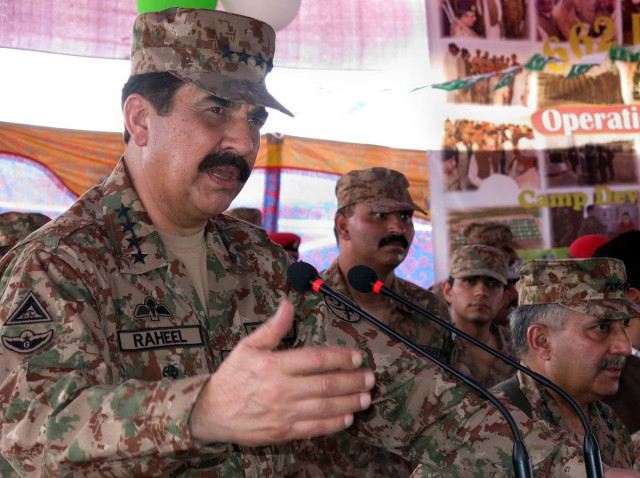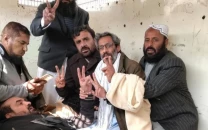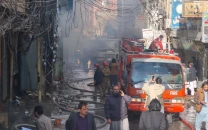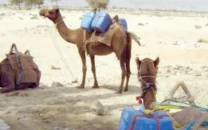The Balochistan cauldron
The need of the hour for Balochistan is for both civil and military leaderships to be reading off the same page

Army chief during his meeting with PM made a pointed reference, warning “foreign agencies and international agencies against trying to destabilise Pakistan by supporting terrorists in Balochistan”. PHOTO: AFP

The Chief of Army Staff, General Raheel Sharif, on April 15 met Prime Minister Nawaz Sharif to discuss the situation. He made a pointed reference, warning “foreign agencies and international agencies against trying to destabilise Pakistan by supporting terrorists in Balochistan”. This is a reference to India, long suspected of stirring the pot in Balochistan for its own purposes; purposes not far removed from tying up Pakistan military resources and creating difficulty on its western flank.
Of particular concern to the civil and military leaderships is the upcoming visit of the Chinese president. It will be recalled that this was deferred in the midst of the dharna crisis in 2014, when parliament was besieged and the political life of the country put on hold, eventually only to be unblocked by the tragedy of the attack on the Army Public School in Peshawar on December 16. There were security concerns at the time of the Chinese premier’s proposed visit and there are security concerns again now, not least because China has taken up a major role for the next 40 years with the development of the port of Gwadar. Chinese workers have been attacked by Baloch insurgents in the past, and the army is keen to “eliminate” their sanctuaries ahead of the Chinese president’s visit. This may be something of a tall order.
Afghanistan adds another layer to the cake. Like Mullah Fazlullah of the Tehreek-e-Taliban Pakistan, the leader of the Balochistan Liberation Army (BLA), which is a banned organisation, also finds refuge over the border in Spin Boldak. Doctor Allah Nazar heads the BLA which has recently claimed responsibility for the killing of the 20 labourers near Turbat — and there are persistent reports stretching back years that India funds the BLA.
Pakistan is putting diplomatic pressure on Afghanistan to move against the BLA, but given the problems that Afghanistan has with moving against any organisation in areas which are under defacto Taliban control — and Spin Boldak is — then we wonder whether anything is likely to come of this. The Afghan intelligence agencies are under the control of Chief Executive Abdullah Abdullah, who is reportedly supportive of the Baloch insurgents, to the considerable frustration of our military and civilian leaderships.
Our relationship with China is of increasing importance, the more so as the churn in relations with the Arab world created by the conflict in Yemen may reshape elements of our foreign policy. The number of Chinese workers in Pakistan is likely to increase dramatically in coming years as joint projects gather traction. Thousands of those workers are going to be in Balochistan working on maritime, energy and transport infrastructure projects, all vital to our continued development. Experience has revealed their vulnerability working as they do in remote out-stations that are easily attacked. The Chinese premier is going to visit Gwadar and it is reported that the insurgents regard him as a prime target and plan to carry out attacks during his visit.
The need of the hour for Balochistan is for both civil and military leaderships to be reading off the same page and acting with a similar resolution and purpose. We wish them well in this endeavour.
Published in The Express Tribune, April 17th, 2015.
Like Opinion & Editorial on Facebook, follow @ETOpEd on Twitter to receive all updates on all our daily pieces.



















COMMENTS
Comments are moderated and generally will be posted if they are on-topic and not abusive.
For more information, please see our Comments FAQ